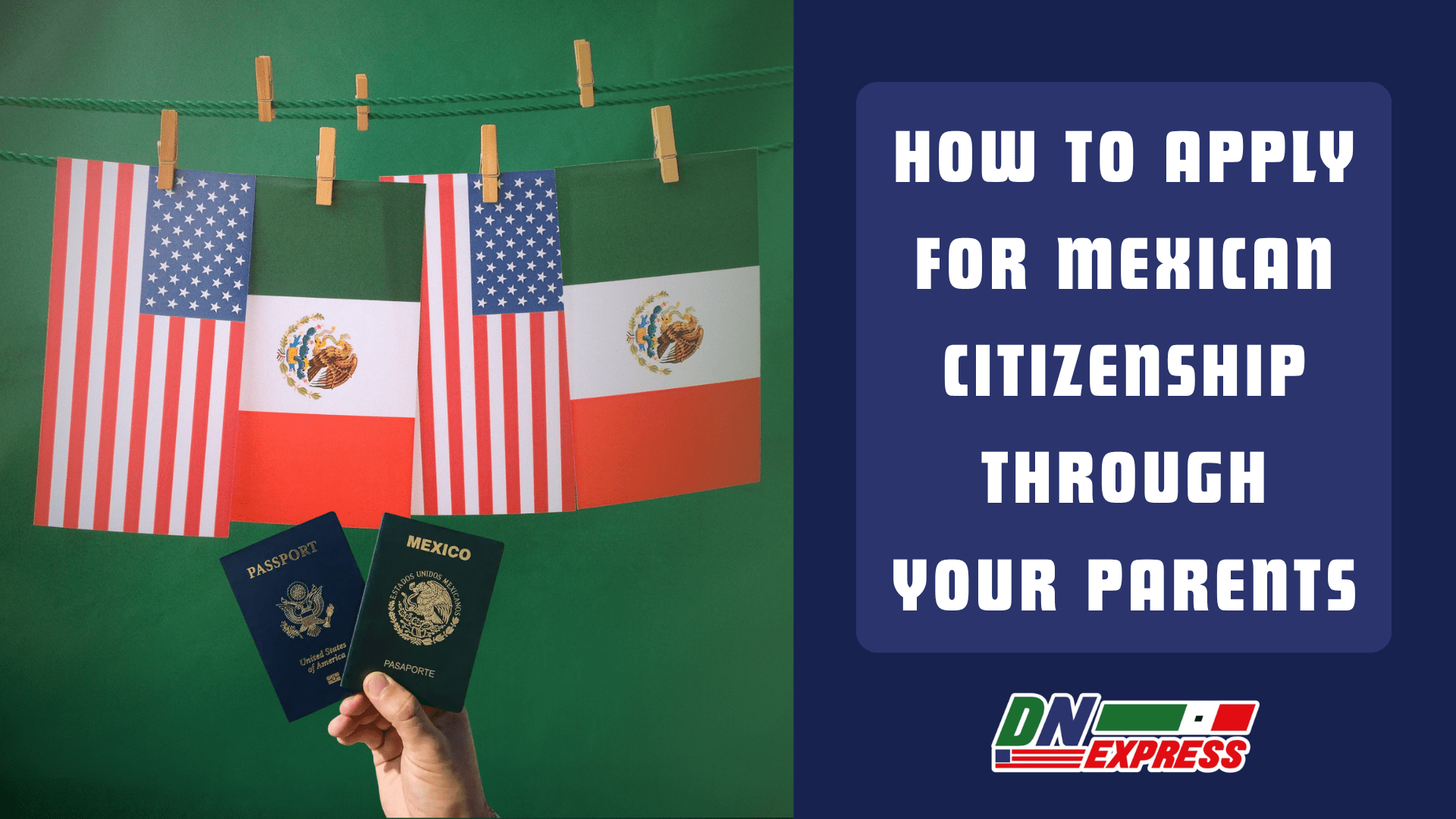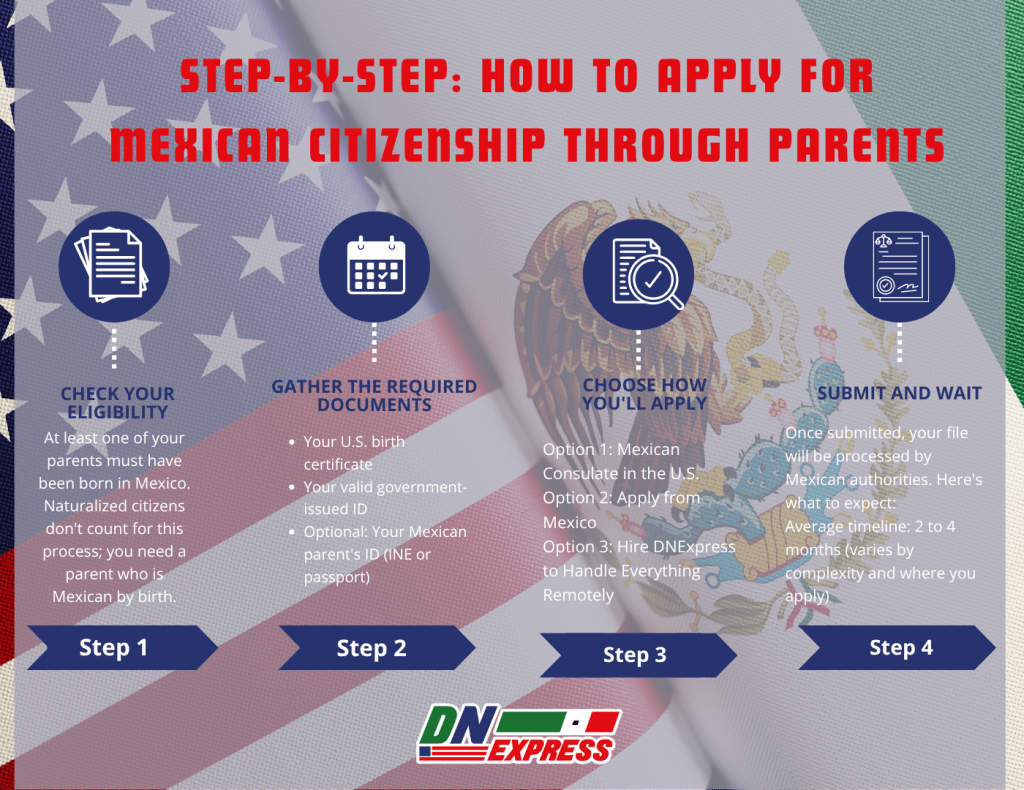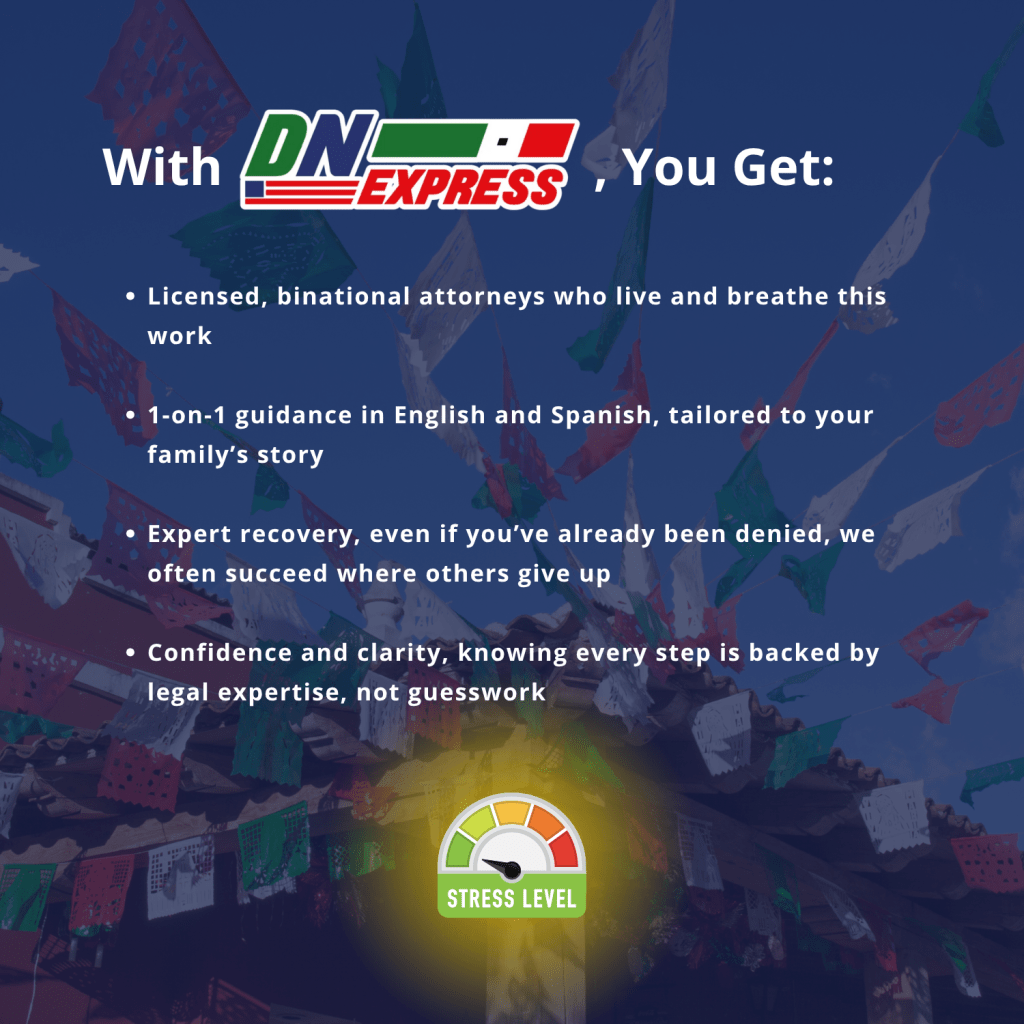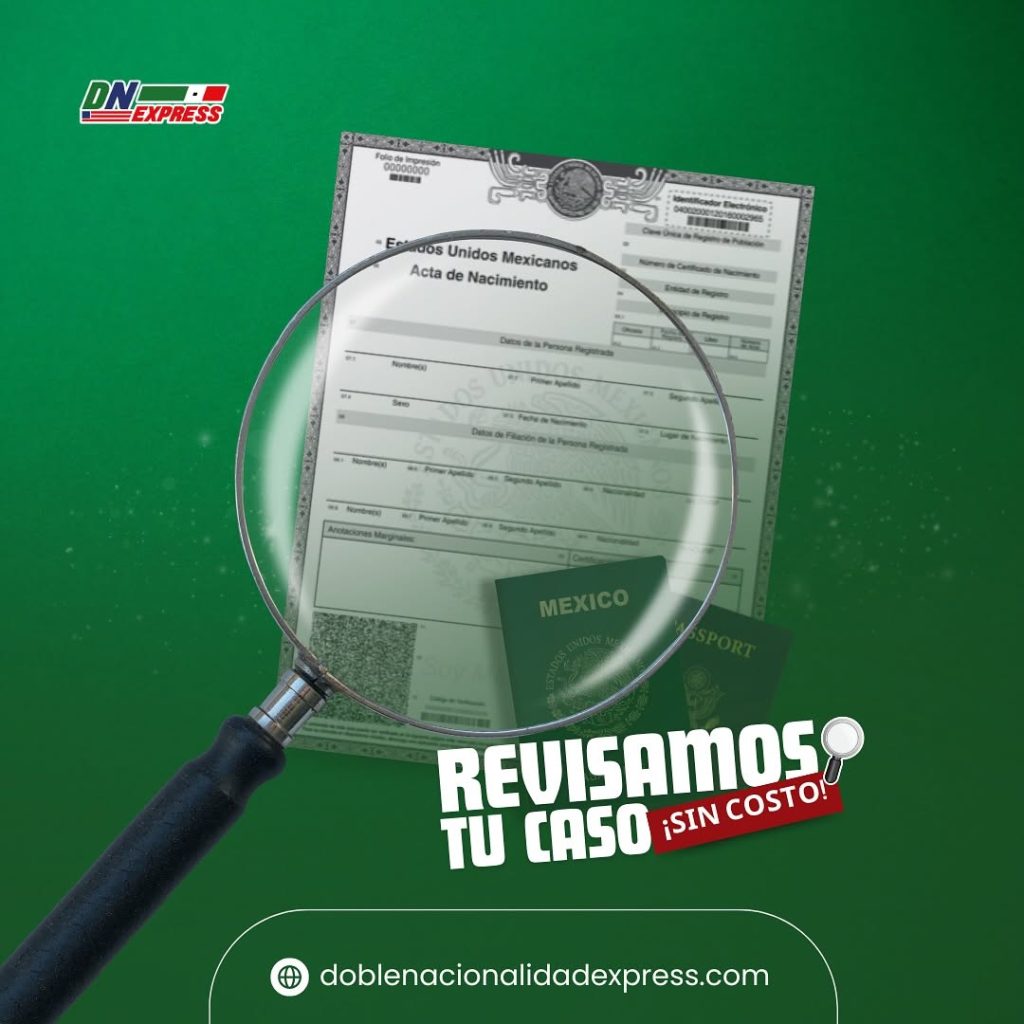
Yes, you can apply for Mexican citizenship through your parents if they were born in Mexico, even if you were born in the U.S. This process is called citizenship by descent, and it's your right by law. Here's how it works, who qualifies, and how to get it done.
Whether you're doing this to reconnect with your heritage, claim legal rights in Mexico, or give your kids more opportunities, the process is surprisingly doable, especially when you know what to expect.
You don't have to live in Mexico, speak Spanish, or visit a consulate if you use the right service.
We help U.S.-born Mexicans and their families reclaim their Mexican nationality, no matter their age, language, or family situation.
Even if you've been rejected before or don't have your parent's documents, we can help you get it done legally and remotely.
Want to know if you qualify, what documents you'll need, or what happens if your parent is unavailable? Keep reading.
We're breaking down everything you need to know, step by step.
Step-by-Step: How to Apply for Mexican Citizenship Through Parents
Getting your Mexican citizenship through your parents is more straightforward than most people think, as long as you meet the basic requirements and avoid the common pitfalls. Here's what the process looks like, start to finish:
1. Check Your Eligibility
To qualify for citizenship by descent (nacionalidad por nacimiento), you must meet one simple rule:
At least one of your parents must have been born in Mexico. Naturalized citizens don't count for this process; you need a parent who is Mexican by birth.
You don't need to speak Spanish, live in Mexico, or be under a certain age.
Whether you're 8 or 48, you can still apply.
Can I get my Mexican citizenship through parents?
Yes. If your mother or father was born in Mexico, you are legally entitled to Mexican citizenship, even if your parent is deceased, unavailable, or estranged. The law protects your right under the principle of jus sanguinis.
2. Gather the Required Documents
The most frequent delays and rejections happen right here: missing or mismatched paperwork. Here's what you'll need:
- Your U.S. birth certificate: Must be the long form, with both parents listed. It also needs to be:
- Your Mexican parent's birth certificateL This is how Mexico verifies your eligibility. We can help retrieve this document if you don't have it.
- Your valid government-issued ID: U.S. passport, driver's license, or state ID will work.
- Optional: Your Mexican parent's ID (INE or passport)
What if I don't have my parent's ID or we're estranged?
DNExpress can help retrieve your parent's birth certificate from Mexico, even if you don't have contact or permission. This is a frequent situation, and we handle it every day.

3. Choose How You'll Apply
Once your documents are ready, you need to decide how to file your application. There are three main paths:
Option 1: Mexican Consulate in the U.S.
If you live near a consulate, this might seem convenient, but many are overwhelmed, under-resourced, and appointment slots are scarce.
If your paperwork is flawless and you speak Spanish, this route could work, but expect delays and inconsistent service.
Option 2: Apply from Mexico
Some people choose to fly to Mexico to complete the process, especially if they're already traveling or visiting family.
It can be faster in smaller cities, but it requires in-person attendance, Spanish fluency, and more coordination.
Option 3: Hire DNExpress to Handle Everything Remotely
This is the simplest and most reliable path for U.S.-based applicants seeking dual citizenship.
- No consulate appointments
- No Spanish required
- No travel
- Licensed attorneys handle every step
- We fix errors, retrieve documents, and deal with Mexican bureaucracy so you don't have to
We've helped clients who were previously denied finally get approved, without ever setting foot in a consulate or courtroom.
4. Submit and Wait
Once submitted, your file will be processed by Mexican authorities. Here's what to expect:
Average timeline: 2 to 4 months (varies by complexity and where you apply)
Once approved, you'll receive:
- Your Mexican birth certificate
- Su CURP (Mexican ID number)
After that, you can apply for your Mexican passport.
Is Mexican citizenship hard to obtain?
Not if you qualify by descent. The key is having the right documents and avoiding consulate bottlenecks.
Many people spend months stuck in the system because they tried it alone. We're here to make sure that doesn't happen to you.

Why Some People Get Denied or Delay Their Citizenship
Even when you're fully eligible, it's surprisingly easy to hit roadblocks if you don't know the system. Here are the most frequent reasons people get stuck or, worse, give up entirely:
Name Mismatches Across Documents
If your name, or your parent's, is spelled differently on various documents (middle names missing, accents dropped, surnames flipped), Mexican authorities may reject your file.
Even small inconsistencies can trigger delays unless they're legally corrected first.
We specialize in fixing document errors before they become roadblocks.
Parent is Deceased or Estranged
Many people assume it's “too late” if their Mexican parent has passed or won't cooperate.
The truth? As long as you have their birth certificate, you can still apply. And if you don't, we may be able to retrieve it for you.
No Access to Original Documents
If you don't have an apostilled birth certificate, your parent's ID, or proof of citizenship, it can feel like a dead end.
That's where most people give up, but you don't have to.
DNExpress handles cases with missing, outdated, or damaged documents every day.
Misinfo from the Consulate
Some consulates confuse citizenship by descent with naturalization and wrongly tell applicants they don't qualify.
Others give conflicting instructions or lose paperwork.
We've helped clients who were told “you can't apply” prove otherwise, without ever returning to the consulate.
Fear of Speaking Spanish or Not Knowing the Law
Let's face it: Mexican legal paperwork is complex, and doing it in a second language makes it worse.
Many eligible applicants delay out of fear they'll mess something up or won't be taken seriously.
With DNExpress, all your paperwork is prepared accurately, in Spanish, and submitted by licensed professionals, so you don't have to translate a single page yourself.
What if the consulate already told me no?
Rejection isn't the end. We've successfully reversed denials by correcting documentation, submitting legal affidavits, and proving eligibility under Mexican law.
DIY vs. Hiring DNExpress: What's the Best Route?
If you're deciding between doing it yourself or hiring legal help, here's a clear look at what each path involves, because time, accuracy, and peace of mind matter as much as cost.
Doing It Yourself
Yes, it's possible to apply on your own, if you meet these conditions:
- You're fluent in Spanish
- You have perfectly matching documents
- You're familiar with apostilles, certified translations, and Mexican civil law
- You can secure a consulate appointment (sometimes months in advance)
- You're prepared to make corrections or reapply if something gets rejected
Most people who try this route get stuck due to delays, unclear instructions, or simple paperwork errors.
Many consulates require in-person signatures, parental involvement, or lengthy back-and-forth communication.
With DNExpress
We built DNExpress to make this process accessible for families who don't speak Spanish, don't live near a consulate, or simply don't want to deal with government paperwork.
Here's what we offer:
- Licensed Mexican attorneys manage your entire case, from documents to delivery
- No consulate visits or parent involvement needed
- We retrieve lost records and fix errors before submission
- Remote process from your phone or email; no travel required
- Progress tracking and real-time support
- Over 3,000 success stories across the U.S., including complex and previously rejected cases
“They helped me apply even though my mom passed away 10 years ago.” (Client from Houston)
If you want certainty, speed, and support, DNExpress is the safest and most effective way to claim your Mexican citizenship.

Take the First Step: You're Probably Already Eligible
Getting Mexican citizenship through your parents is possible; it's your legal right.
And for most people, it's easier than they've been told.
But trying to do it on your own, especially with name issues, missing records, or an unhelpful consulate, can drag things out for months or even years.
You deserve a process that respects your time, your identity, and your family's legacy.
Get a Free Case Review
We've helped thousands of families across the U.S. secure Mexican citizenship without leaving home, speaking Spanish, or dealing with government red tape.
And we'd be honored to help you, too.
There's no cost to find out if you qualify.
Send us a message, and we'll review your case, explain what's possible, and outline your next steps.
Call, WhatsApp, or Email. No Appointments. No Stress. Answers.
You don't need to wait months for a consulate appointment or figure this out alone.
You've got questions; we've got a binational legal team ready to help.
Reclaim your Mexican nationality. Give your kids a cultural passport.
Do it the right way, the legal way, with DNExpress by your side.

Schedule a Free Case Review o Message Us on WhatsApp
Frequent Questions Answered
Still have questions about how Mexican citizenship through parents works? Here are the most frequent ones we hear, along with the answers that can help you move forward confidently.
Can you get citizenship through your parents?
Yes.
Mexico grants citizenship by birth to anyone born to a Mexican parent, even if the child was born outside the country.
This legal principle is called jus sanguinis (citizenship by blood). It's your right, and there is no expiration date on that right.
How many generations back can you claim Mexican citizenship?
Typically, the process applies if your parent was born in Mexico.
However, there are cases where grandchildren may qualify indirectly by helping their parent apply first, then applying through them.
This is sometimes referred to as “chain nationality.”
If your parent is eligible but never applied, DNExpress can often help both of you get citizenship, one generation at a time.
When did the U.S. allow dual citizenship with Mexico?
The U.S. has never officially prohibited dual citizenship.
Mexico formally recognized dual nationality in 1998, making it fully legal to hold both passports without renouncing either one.
You don't lose your U.S. citizenship by claiming your Mexican one.
Do I have to pay taxes in Mexico if I have dual citizenship?
Not unless you live or earn income in Mexico.
Having Mexican citizenship by descent doesn't create tax obligations unless you're a resident or doing business there.
If you're a U.S. resident, your taxes stay the same.
What documents do I need to get a Mexican passport?
Once your Mexican citizenship is confirmed and your birth is registered in Mexico, you'll need:
- Your new Mexican birth certificate
- Your CURP (Clave Única de Registro de Población)
- A valid ID (Mexican-issued or from the U.S., depending on the office)
DNExpress offers this as part of our remote process; we help you obtain every required document so you're passport-ready.



